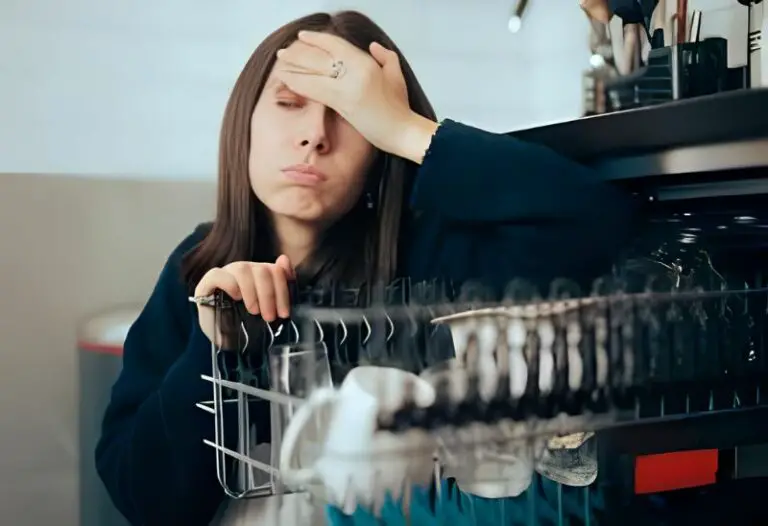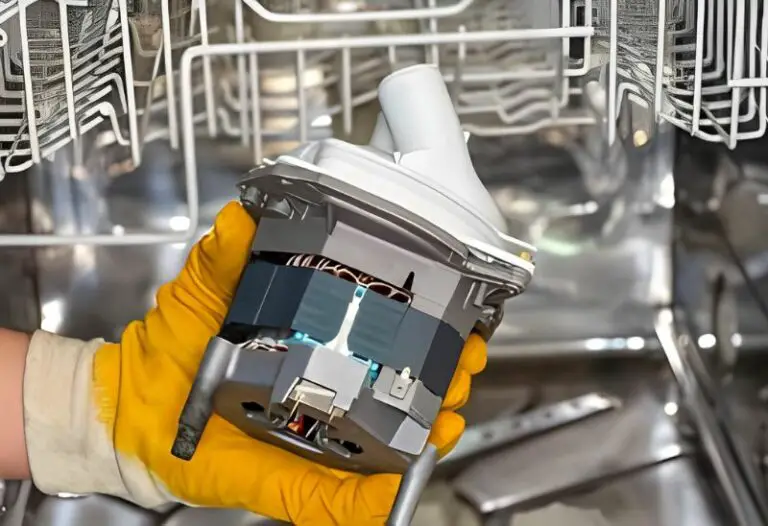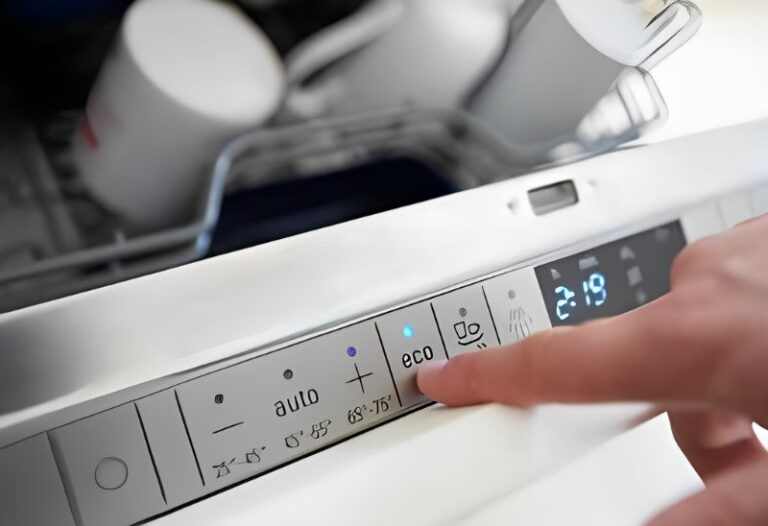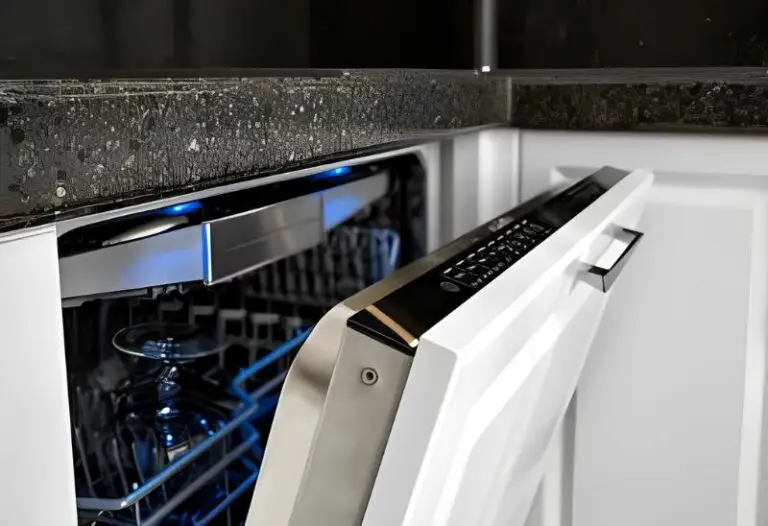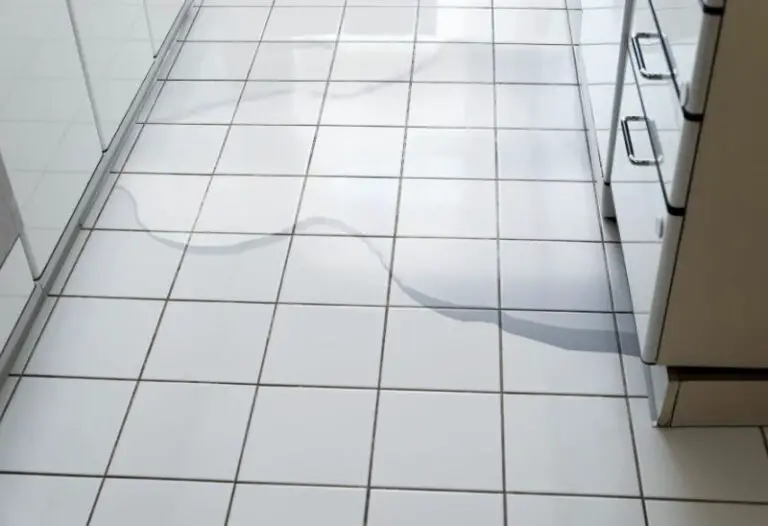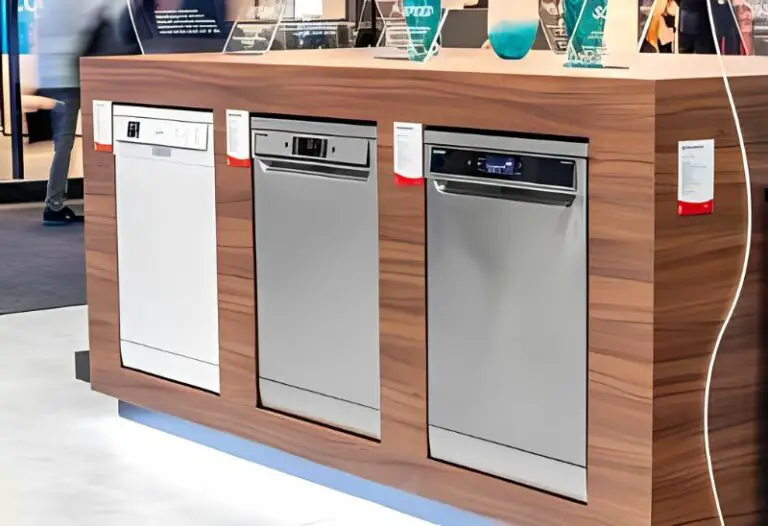Imagine this: You load your dishwasher, press the button, and… silence. No gurgling, no spinning, just the eerie quiet of culinary betrayal. Your dishes, trapped in a soapy purgatory, mock your hunger.
But fear not, brave chef! This is no ordinary appliance outage, it’s a mystery worthy of Sherlock Holmes. We’ll delve into the depths of your dishwasher’s circuitry, plumb the secrets of its pipes, and expose the mechanical mischief behind its untimely demise.
Prepare to crack the case, reclaim your kitchen, and dish out justice (and clean plates) once more!
Key Takeaways
- Dishwashers can stop due to multiple issues including electrical or mechanical faults.
- Routine maintenance and troubleshooting can often resolve early signs of problems.
- Addressing the most common causes can prevent future interruptions in dishwasher cycles.
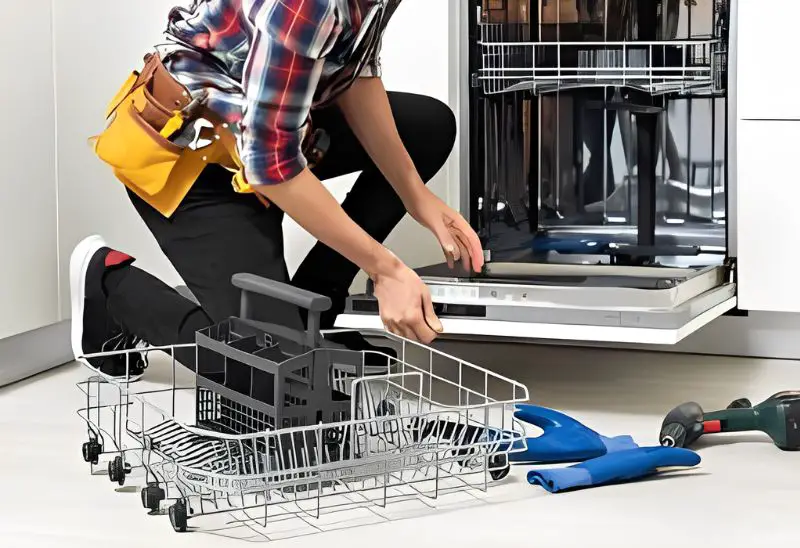
Troubleshooting Tips
When your dishwasher stops a few minutes into the cycle, it can be puzzling. Let’s work through some basic troubleshooting steps to find out what might be going wrong.
Identify the Shutoff Behavior:
- If there’s a complete shutoff, your dishwasher stops entirely—no lights or sounds.
- A partial shutoff might occur; here, lights or the display might stay on, but cycles don’t continue.
- Repeated on/off cycles are short bursts of activity followed by the appliance turning itself off.
Check Basic Issues:
- Power Supply: Make sure the dishwasher is plugged in well. No loose cords or unplugged connections.
- Door Latch: Check that the door is firmly shut and the latch clicks. A faulty latch can stop the cycle.
- Water Supply: Your dishwasher needs proper water pressure. Double-check that the supply valve is open and connected.
- Control Panel: Sometimes, simply resetting your dishwasher or trying a different cycle can do the trick.
Here’s how to approach each issue:
- Restart the Cycle:
- Press the power button or turn off the circuit breaker for a minute.
- This can serve as a reset for the appliance.
- Examine the Door Latch:
- Open and close the door a few times.
- Listen for the click that tells you the latch is engaging correctly.
- Inspect the Water Supply:
- Look for kinks in the hose under the sink.
- Ensure the water valve is turned on for proper flow to the dishwasher.
- Power Supply Issues:
- Check for tripped circuit breakers or a blown fuse.
- Loose plugs or sockets can also be a problem.
- Control Panel Problems:
- The dishwasher’s brain might need a reset.
- Hold the start button or use the main power switch.
If these steps don’t resolve the issue, you may need to look into other components like the thermal fuse, pressure switch, circulation pump, or consult with a professional for a repair or replacement. Remember, you’re looking for clues of what’s not working right—a little detective work goes a long way!
Potential Causes and Solutions
Why Does My Dishwasher Shut Off After a Few Minutes? Here are the potential causes and solutions:
Water-Related Issues
When your dishwasher shuts off after a few minutes, it can be frustrating, especially when dishes are at stake. Let’s zero in on water-related issues that might be causing this abrupt stop.
Clogged Drain:
- Symptoms: You might notice standing water at the bottom of your appliance or an error code flashing that hints at a drainage problem.
- Solution: Your first step is to check and clean the drain filter. Remove any food residue, soap bits, or other blockages from the drain hose. It’s a straightforward task that could save you from further headaches.
Faulty Drain Pump:
- Symptoms: If the appliance makes gurgling sounds, or you see that water isn’t draining out, your drain pump might be the culprit.
- Solution: Look for malfunctions or leaks in the pump. If you’re not comfortable with DIY fixes, don’t hesitate to call a professional to take a peek and repair it, if necessary.
Water Inlet Valve Malfunction:
- Symptoms: No water coming into the dishwasher or an associated error code can indicate that the water inlet valve isn’t cooperative.
- Solution: To tackle this, grab a multimeter to test the valve. If it’s not working as it should, replacing the valve is typically the best course of action.
Ensuring the proper functioning of your dishwasher is crucial for the cleaning process; after all, no one wants unwashed dishes! If you come across these issues, consider them a gentle nudge to give your dishwasher a little TLC.
Remember, dealing with water-related issues early can prevent problematic leaks and help maintain the overall health of your cleaning appliance. Keep it running smoothly, and it’ll take care of your dishes without interruption.
Electrical Issues
When your dishwasher stops unexpectedly, it might leave you puzzled. Let’s explore some electrical issues that could cause such behavior.
Thermal Fuse Overheating Imagine your dishwasher is like a sprinter. If it runs too fast and overheats, it needs to stop and cool down. Here’s what might happen:
- Symptoms:
- Shutoff after heating cycle
- Possible burning smell
- Solution:
- Find out why it’s overheating. Could be a clogged filter or a faulty heating element.
- Get it fixed or replaced, but remember, dealing with a thermal fuse is serious business. It’s best to call in a pro.
Control Board Errors Think of the control board as the dishwasher’s brain. Sometimes it might get confused and do things like:
- Symptoms:
- Acting up with erratic behavior
- Randomly turning off
- Lights flickering
- Solution:
- Try a power reset to clear its thoughts. Unplug it, wait a bit, then plug it back in.
- If it can be updated, check for a firmware update.
- Still not acting right? It might be time for a professional to take a look.
Remember, anything with power and motors, like a dishwasher, can face interruptions from issues in the power source or internal components. When in doubt, a reset might just do the trick.
But if your dishwasher keeps turning off, you could be dealing with something that needs a closer look from someone with experience.
Mechanical Issues
Your dishwasher cutting short its cycle can be discouraging, especially if you’re looking forward to clean dishes at the end of a full cycle. Let’s look into a couple of mechanical issues causing these abrupt stops.
Faulty Door Switch
If your dishwasher halts right after it begins, consider the door switch as your first culprit. Think of it like this: when the door isn’t latched properly, the dishwasher won’t start to prevent water from leaking out. Similarly, a malfunctioning door switch will do the same – it’ll start and then think the door opened, stopping the cycle.
Test and Solution:
- Test: Close the door and start your dishwasher. If it stops when the door is supposedly shut, the switch might be at fault.
- Fix: You can check the switch with a multimeter or call a professional to replace it if it’s not working right.
Motor Overheating
Another common mechanical gremlin could be your dishwasher’s motor getting hot under the collar. That’s right, overheating. You might hear the motor make a humming noise but then it decides it’s had enough and takes a break.
Cause and Handling:
- Symptoms: Your dishwasher shuts off after the agitation cycle, maybe even making an unusual noise.
- Care: Ensure no debris clogs your pump or spray arms, affecting water circulation.
- Professional Touch: If clearing blockages doesn’t solve it, the motor may need attention, which usually means it’s repair time with a technician.
Quick tip: Regular maintenance, such as cleaning filters and checking for obstructions, can often prevent these issues from occurring. Be mindful of these potential signs and act on them immediately to ensure your dishwasher runs smoothly for your next cleaning session.
Advanced Troubleshooting
Let’s explore some advanced troubleshooting steps that go beyond the basics:
- Check Error Codes: Your dishwasher might be displaying error codes that can clue you in on the problem. Grab the manual and look up the codes to guide your next steps.
- Water Pressure Issues: Ensure you have proper water pressure. Low water pressure can prevent the dishwasher from completing a cycle.
Water Intake and Motor Function:
- Confirm that the dishwasher is filling with water, and listen for the sound of the spray arms.
- Inspect the motor as it’s vital for creating water pressure. An underperforming motor could stop the dishwasher mid-cycle.
Circulation Pump & Nozzles:
- Check the circulation pump; a malfunction here could be problematic.
- Examine the nozzles for clogs. Poor water distribution can impact cleaning and cause shut-offs.
Control Panel and Power Supply:
- Make sure the control panel is working correctly.
- If there’s a power issue, a reset can help. Unplug the dishwasher for a minute and plug it back in.
Drying and Heating Functions:
- Verify that heating elements are working; issues here could lead to shutdowns.
- Note if dishes are drying correctly after the cycle interrupts.
Detergent Use:
- Excessive detergent may harm the motor and sensors. Use the recommended amount.
If the DIY route doesn’t fix the problem, it’s wise to call in a professional. An experienced appliance repair tech can diagnose and resolve issues effectively.
Remember to check if your dishwasher is still under warranty; this might save on repair costs. Always prioritize safety and when in doubt, seek help from a service center.
Preventative Maintenance Tips
Regular Cleaning
Let’s keep things running smoothly! Ensure you routinely clean the filters, spray arms, and your dishwasher’s interior. A clogged filter or spray arm can lead to blockages, reducing the efficiency of your machine and might even cause it to shut down prematurely. Here’s what you can do:
- Remove and rinse filters under running water.
- Check spray arms for food particles and remove any obstructions.
- Wipe down the interior with a soft cloth and mild cleaner.
Proper Loading
You want all your dishes to come out sparkling, right? Make sure you’re loading them correctly. Incorrect placement can cause blockages that can stop the cycle. Follow these tips:
- Place dishes facedown and spaced apart.
- Avoid nesting spoons together.
- Ensure nothing obstructs the spray arm’s rotation.
Use Appropriate Detergent
Your dishwasher loves the detergent it was designed for. Using too much, the wrong kind, or not enough can affect cleaning performance:
- Stick with the detergent type recommended by the manufacturer.
- Measure detergent according to the instructions — no eyeballing!
Avoid Overloading
Your dishwasher needs space to do its job. Overloading it can prevent dishes from being cleaned properly and might lead to water not reaching all dishes, causing the machine to halt:
- Allow for gaps between dishes.
- If you have a lot of dirty dishes, consider running multiple smaller loads.
By following these simple steps, you’ll help ensure that your dishwasher performs at its best and reduce the likelihood of it stopping mid-cycle.
Frequently Asked Questions
Sometimes, dishwashers can be a bit finicky and may stop at the most inconvenient moments. If your dishwasher shuts off shortly after starting, or mid-cycle, there could be a variety of culprits, from a blocked pump to a simple power failure. Let’s address some common questions you might have when facing these interruptions.
What could cause my dishwasher to stop running shortly after starting a cycle?
If your dishwasher stops soon after it starts, check for a blocked pump or a power supply issue. Debris or food particles can obstruct the pump, leading to a shutdown, and insufficient power can cause the dishwasher to turn off in an effort to protect itself.
Are there common issues that lead to a dishwasher shutting off mid-cycle?
Yes, several factors can cause a dishwasher to stop mid-cycle, such as a power failure, a faulty door latch, or problems with the control panel. A power outage is clear cut; if power is gone, the machine will stop. For the door latch and control panel issues, these might require a technician’s help.
How can I troubleshoot a dishwasher that stops running and leaves water at the bottom?
Firstly, check the dishwasher filter and drain for clogs. If the filter is dirty or the drain is blocked, water can’t exit the machine efficiently, causing it to stop. Make sure to regularly clean the filter and clear the drain to prevent these stoppages.
What should I check if my dishwasher begins its cycle but stops and starts beeping?
This often indicates a diagnostic code that can help pinpoint the problem. Refer to your dishwasher manual to decipher the beeping pattern and understand what issue your dishwasher might be trying to tell you about. Common causes could be sensor or water heater issues.
What steps can I take if my dishwasher’s lights start blinking and it ceases to operate?
Blinking lights are typically a sign of an electronic malfunction. You could try resetting the dishwasher by unplugging it for a few minutes. If the problem persists, it might be a more serious electronic issue, and you may need to contact a professional.
Why might a dishwasher fill with water but then halt without completing the wash?
This could be due to a malfunction with the water heater or thermostat. Your dishwasher needs to reach a certain temperature to operate correctly, and if it can’t, it may halt the cycle. It could also be a sign of a faulty timer or a defective inlet valve, which would need inspection or replacement.
